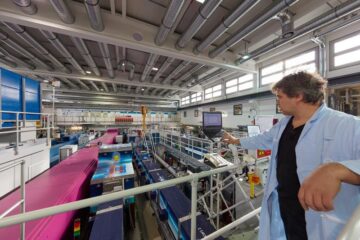Innovation at the Service of the Patient

Transferring innovations form nanotechnology to medical applications is seen by many experts as a highly important contribution to the development of the 21st century’s health care systems.
In nearly all fields, nanomedical approaches have the potential for revolutionary improvements in diagnostics and therapy.However, the way from a discovery or invention to its clinical application is often a long and difficult one. Only gradually do innovations from nanomedical research find their way to the user.
An important progress in this area has recently been achieved by Berlin MagForce Nanotechnologies AG. After two decades of intensive research and development, and after various clinical trials, the results of which even boldly outdid expectations in some cases, this year the company received the European approval for its nano cancer therapy. Now this method needs to be placed at the disposal of the patient as quickly as possible.
As the Conference President of the “NanoMed 2010 – 7th International Conference on Biomedical Applications of Nanotechnology”, to be held in Berlin on December 2 – 3, MagForce founder Andreas Jordan will report on this mile stone.
Since its establishment in 1999, the NanoMed conference series has developed into one of the most important international meeting places for researchers and users in the field of nanomedicine. It is organized by cc-NanoChem e. V. and NanoBioNet e. V., two associations which are going to merge next year to form Germany’s biggest nanotechnology network.
Mauro Ferrari (University of Texas), one of the leading pioneers in American nanomedicine has accepted the invitation to give the Conference Key Note Lecture.
Focus Topic of this year’s NanoMed is Tumor Therapy. In the session dedicated to this issue, Hossam Haik (TECHNION, Haifa, Israel) will report on the detection of tumor markers in breath samples.
However, other areas of nanomedicine will be highlighted as well. Research at the frontier on nanotechnology and neurosciences will be the topic of the talk by Michele Giugliano (University of Antwerp, Belgium).
Gert Storm (University of Utrecht, The Netherlands) will present new concepts of nanotechnology-enabled drug delivery.
New nanomaterials for implants and regenerative medicine will be featured by Jöns Hilborn (University of Uppsala, Sweden).
Patrick Case (University of Bristol, UK) will speak about weighting opportunities and risks of medical applications of nanomaterials.
Contributions to the conference can be submitted till October. For the first time a Poster Prize for young researchers will be awarded.
Media Contact
Weitere Informationen:
http://www.nanomed-berlin.deAlle Nachrichten aus der Kategorie: Veranstaltungsnachrichten
Neueste Beiträge

Bakterien für klimaneutrale Chemikalien der Zukunft
Forschende an der ETH Zürich haben Bakterien im Labor so herangezüchtet, dass sie Methanol effizient verwerten können. Jetzt lässt sich der Stoffwechsel dieser Bakterien anzapfen, um wertvolle Produkte herzustellen, die…

Batterien: Heute die Materialien von morgen modellieren
Welche Faktoren bestimmen, wie schnell sich eine Batterie laden lässt? Dieser und weiteren Fragen gehen Forschende am Karlsruher Institut für Technologie (KIT) mit computergestützten Simulationen nach. Mikrostrukturmodelle tragen dazu bei,…

Porosität von Sedimentgestein mit Neutronen untersucht
Forschung am FRM II zu geologischen Lagerstätten. Dauerhafte unterirdische Lagerung von CO2 Poren so klein wie Bakterien Porenmessung mit Neutronen auf den Nanometer genau Ob Sedimentgesteine fossile Kohlenwasserstoffe speichern können…





















